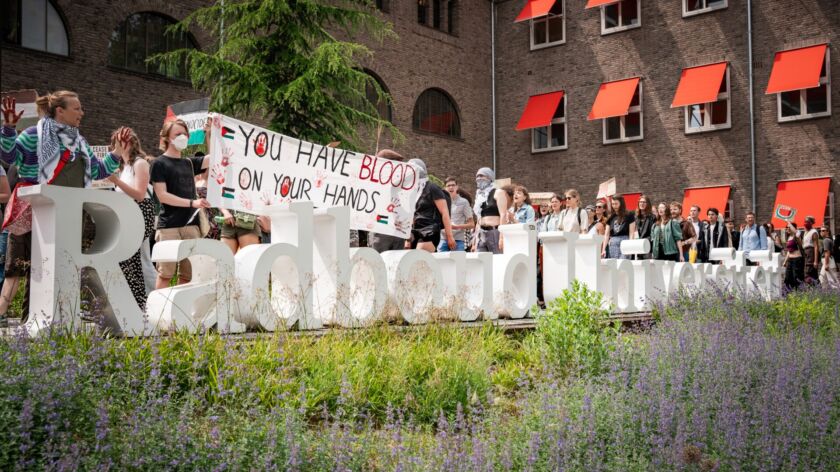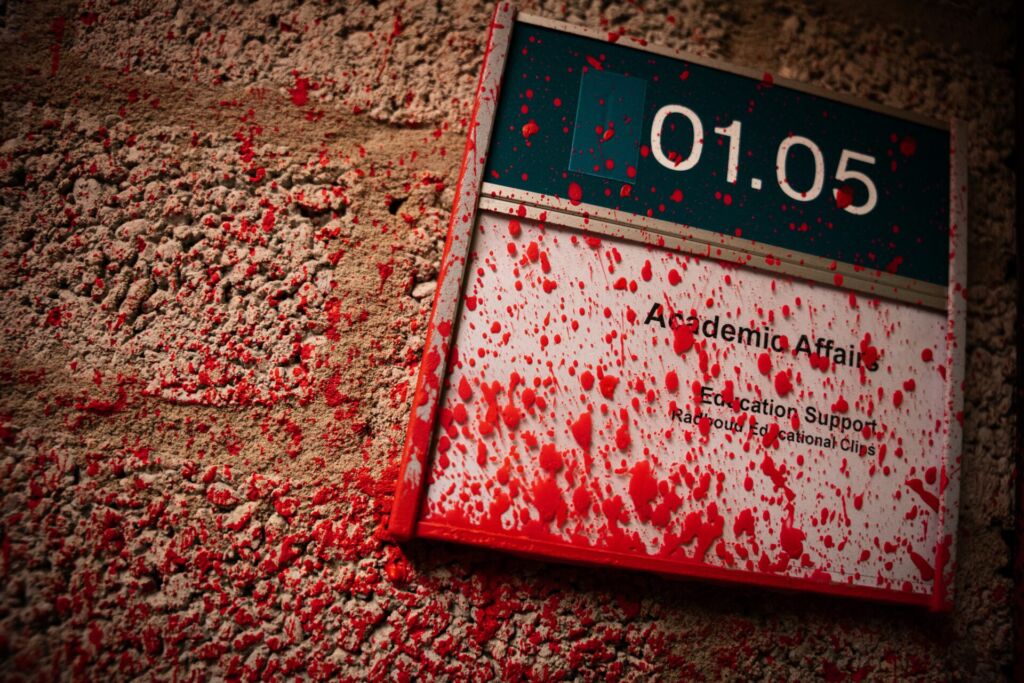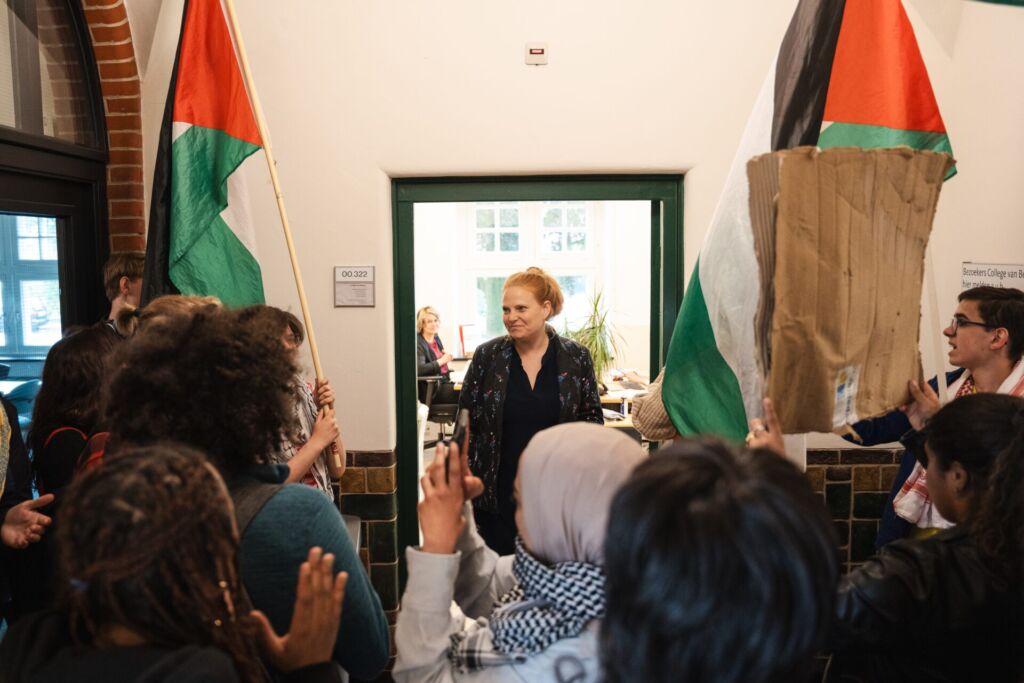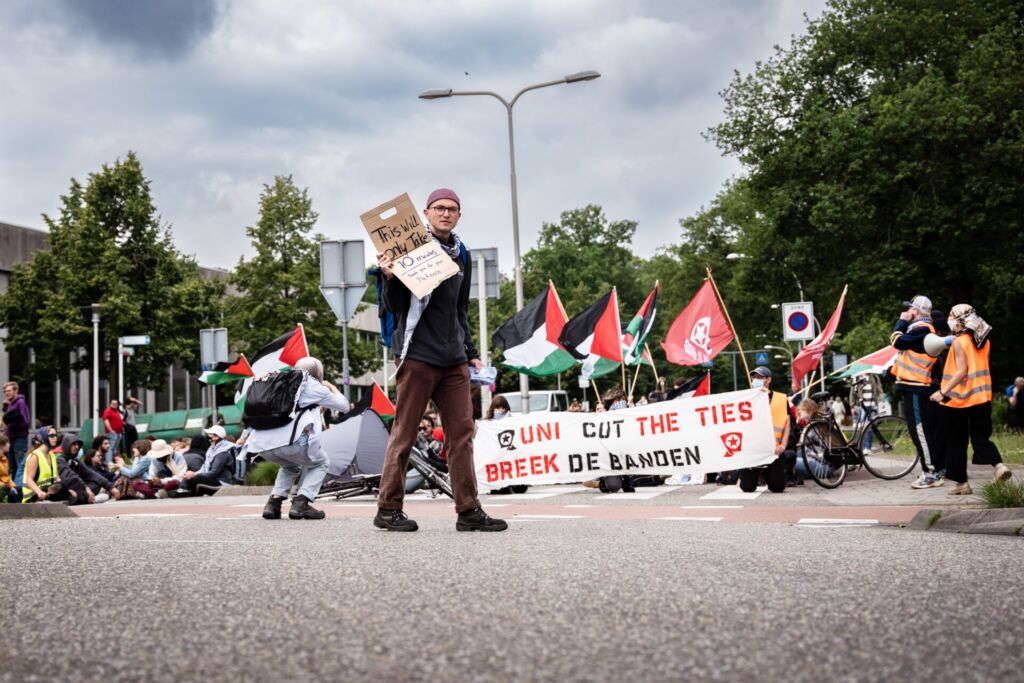Executive Board on restricting the right to protest: ‘Severe measure, but necessary’
-
Pro-Palestina demonstratie bij het bestuursgebouw. Foto: Johannes Fiebig
It is not yet certain whether Radboud University will maintain its ties with Israeli partner institutions. This academic year, an advisory committee will review these collaborations. That say Rector José Sanders and Executive Board President Daniël Wigboldus in an interview, a month after student protests erupted in Nijmegen. ‘We simply cannot allow this kind of destruction’
The interview with rector José Sanders and executive board president Daniël Wigboldus has been underway for about half an hour when Wigboldus feels compelled to share his thoughts. ‘I really enjoy the open nature of this campus and the way we interact with each other at this university. There is a kind of open-mindedness here, people approach each other. I would very much like to maintain that.’
In recent weeks, this open character of the university has taken a significant hit. After four weeks of campus protests, security on campus has visibly increased. Those wanting to demonstrate for the Palestinian cause can now only do so in a dark parking lot next to the sports center. Mayor Bruls cleared the protester’s camp and announced strict measures this weekend following the vandalism during the occupation of Thomas van Aquinostraat 1 last week.
Do you think that the mayor’s measures are justified?
Sanders: ‘We understand why the mayor made these decisions. Although they are severe measures, we have indicated that we support them.’
Wigboldus: ‘All students and staff must be able to express their voices on campus, including through demonstrations. We feel a responsibility to uphold that. But we are also responsible for the campus as a whole, ensuring that education, research, and exams can continue. You have to weigh these factors against each other.’
‘What happened at TvA 1 can be described as disorderly, to say the least.’
‘In the past few weeks, we have given a lot of space to various forms of protest. We also saw that the actions became increasingly intense, culminating in the occupation of buildings and acts of vandalism. You have seen the footage from Thomas van Aquinostraat 1. What happened there can be described as disorderly, to say the least. So, we fully understand that the mayor is now invoking the Public Assemblies Act to impose restrictions. This is not what one would want, but it is necessary.’
How long should these measures last?
Wigboldus: ‘That is up to the mayor. He has imposed them.’
How did it come to this?
Sanders: ‘We had multiple discussions with the activists. The students, and the staff supporting them, presented their demands during those conversations. Each time, we listened carefully.’
Wigboldus: ‘The demands, combined with the escalation model behind them, made it very complicated to have those conversations. We were explicitly told: if you do not meet our demands, the protest will escalate to the next phase. After a few rounds of this, we concluded that we cannot engage in dialogue under these conditions.’
‘At the same time, we not only hear from the activists but also from others. We received many emails and had many conversations, for example, with people who felt unsafe because of the noise of the protests, certain slogans, or the face-covering of some activists. We are also responsible for these people and their safety. Therefore, we try to engage with the broader community, including deans and the participatory bodies.’
Critics say that there has been too little substantive discussion about the demands and too much focus on procedures, like what is allowed and what is not.
Wigboldus: ‘As I mentioned, it was very difficult to hold those substantive discussions. In the meantime, we have addressed the points raised by the protesters. Take the demand for transparency. We have looked into our collaborations and published them on the website. The same goes for the advisory committee that will assess international collaborations. We are currently working on its establishment.’
Sanders: ‘We have repeatedly emphasized to the protesters how significant their impact has been. Look at what you have achieved and what you have put on the agenda. From now on, we as a university will systematically review our collaborations with institutions everywhere.’
However, we read in an open letter from all Dutch rectors in Trouw last weekend that universities do not want to sever their ties with Israel. How does that align with your position?
Sanders: ‘That part of the letter has been misunderstood. What we wanted to convey is that we will evaluate all foreign collaborations. Some universities already have a framework for this, while others, like us, are still developing one. Future collaborations will be assessed according to this framework.’
‘We do not want to categorically sever ties with any country.’
Sanders: ‘The headline in Trouw was: “We do not want to isolate Israeli scientists.” Other media (including NOS and Vox, eds.) interpreted this as universities not wanting to sever ties with Israeli institutions. What we actually wrote was that we do not want to categorically sever ties with any country. This means we do not want to break all connections with institutions in a certain country with a single stroke of the pen. We would only consider this if the national government explicitly requests it, as was the case with Russia.’
So, you don’t rule out that ties with Israeli universities might still be severed?
Sanders: ‘That’s correct. The intention is for the advisory committee to provide advice on this matter.’
Is it conceivable that Radboud University might make a different decision from other Dutch universities?
Sanders: ‘Each university can make its own decision on this.’
Wigboldus: ‘This falls under the academic freedom of universities.’
The Human Geography and Environment programmes did not want to wait and have declared that they will no longer collaborate with Radboud University’s Israeli partners. What do you think about that?
Wigboldus: ‘We are currently investigating what that exactly means. We want to do this carefully, and that takes time.’
Isn’t it the Executive Board’s responsibility to handle institutional ties? Can programmes make such decisions on their own?
Sanders: ‘Staff members of the programmes are literally saying they no longer support these agreements. This is a personal decision for them. It appears that they are able to make this decision under academic freedom.’
Aren’t you frustrated by this? Doesn’t it undermine your decision to maintain the ties?
Wigboldus: ‘According to the definition of academic freedom, scientists are free to choose whom they collaborate with and how they conduct their education.’
Is it already clear when the advisory committee will start its work and who will be on it?
Sanders: ‘The committee should be formed within this academic year. How it will operate and who will be involved is currently being worked out. We are in discussions with the faculties about this.’
Will the committee first review collaborations with Israel?
Sanders: ‘We have stated that we will first look at universities in large-scale conflict areas. Right now, Israel and the Palestinian territories fall into this category.’
Have you had contact with the Israeli partner institutions, namely Tel Aviv University and Hebrew University of Jerusalem, since the student protests began?
Sanders: ‘We initiated the contact and are waiting for a response.’
What is the main topic you want to discuss?
Sanders: ‘We have many questions. For instance, how they view human rights violations and the core values of academic freedom. How they treat Palestinian students and staff. Their settlement policies. These are the kinds of issues we want to discuss. It will be an open conversation between partners.’
‘We will share our concerns and gauge if they are shared on the other side.’
Wigboldus: ‘The issue is whether we share the universal values of academia, as outlined in the Magna Charta (a document on academic freedom and university autonomy from 1988, signed by universities from 94 countries, ed.). This includes academic freedom and the desire to contribute to a better world. The question is: where are the boundaries? How do you define them, and who determines them? Regardless, we must ask these questions. That is the baseline starting point. We will also share our concerns and gauge if they are shared on the other side.’
For the protesters, this isn’t happening fast enough. On the day the tent camp was set up, there was a lecture by scientist Maya Wind. Among other things, she mentioned that Hebrew University has close ties with the Israeli military. Does this still necessitate conducting an investigation?
Sanders: ‘I attended that academic lecture, which was quite significant. However, as the Executive Board, we operate in an administrative role and engage in dialogue with administrators.’
Did you not leave the room with the feeling that immediate action was necessary?
Wigboldus: ‘That’s precisely why such an advisory committee is crucial: to support and advise us in these matters. It takes time, but we want to handle it carefully, looking towards the future. We want to weight and consider everything.’
Sanders: ‘Similar to our Research Integrity Committee, the advisory committee will be able to draw on expertise from various fields of study. Depending on the area of conflict or war, relevant expertise will be utilized.’
But you do see what is happening in Gaza on the news, don’t you?
Sanders: ‘It is very sad and disturbing what is happening there. It deeply affects us. Both the attack on October 7 and the subsequent escalation of violence, the countless devastations, and the human rights violations.’
Wigboldus: ‘On this, there is no difference in opinion between us and the protesters. Where we differ in perspective is whether this should lead to a categorical severance of ties with colleague universities or not.’
Sanders: ‘We aim to create policies that can be consistently applied to similar future situations, although we hope they do not arise. This is our administrative responsibility, and we stand by it.’
Have you also been in contact with Palestinian universities?
Wigboldus: ‘I know there are discussions between UNL (Universities of the Netherlands, ed.) and the Ministry of Education, Culture and Science. With Universities of the Netherlands, we are considering ways to contribute to the rebuilding of the educational structures as soon as conditions allow.’
Eviction
On Monday evening, May 27th, at exactly 11:00 p.m., president of the executive board Daniël Wigboldus has a final conversation at the entrance of the Erasmus building with protester spokesperson Ties. Activists had occupied a side wing of the building at the time. ‘In that moment, I still hoped, deep down, that everyone would go home voluntarily,’ Wigboldus says now. ‘But I knew there was a good chance it would end in an eviction.’
Did you ask the police beforehand to use as little violence as possible?
Sanders: ‘We did so emphatically and repeatedly. We emphasized that these are our students.’
Was your request honored?
Wigboldus: ‘I feel so, yes. At the same time, the police are faced with a situation that is difficult to predict.’
After the eviction, protesters said you endangered them by involving the riot police (ME).
Wigboldus: ‘We feel responsible for the physical and social safety of the entire broad academic community. Education was disrupted, protesters had barricaded themselves. Ultimately, we had to take responsibility, no matter how sad it was.’
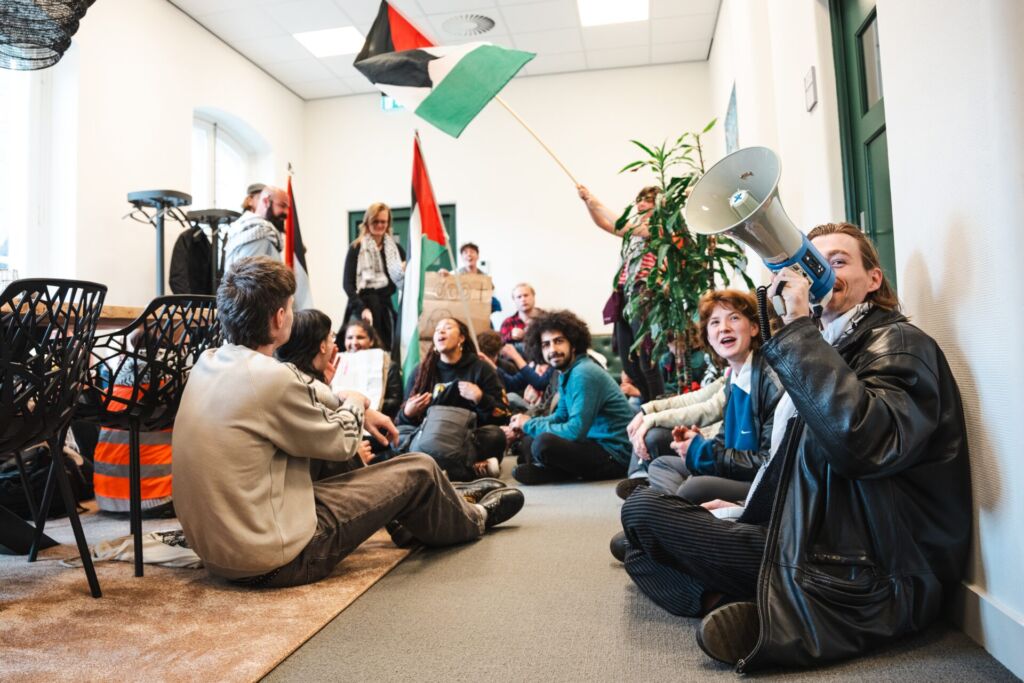
Before the occupation of the Erasmus building, two activists were intercepted by university security guards. According to the activists, the security guards used force, including a neck hold, and there are supposedly security camera recordings of the incident. Is this being investigated?
Wigboldus: ‘This is being evaluated, which is standard procedure for such actions by our security team. Police were also involved. Complaints can also be filed, but as far as I know, that hasn’t happened.’
Do you not know if a neck hold was used?
Wigboldus: ‘No. I haven’t seen any camera footage of that.’
A week and a half later, protesters occupied another building, this time at the Thomas van Aquino 1.
Wigboldus: ‘I want to emphasise that not all protesters are the same. Some are voicing their opinions peacefully, while others engage in these activities. At one point, vandalism occurred, involving graffiti. We simply cannot allow this kind of destruction.’
Is there an investigation into the damage at TvA1, and could there be consequences?
Wigboldus: ‘We have consistently stated that we will report damages. We have done so now, and it’s up to the police to proceed. It is not our role to investigate who caused what.’
Is it not an option to recover the costs from the protesters?
Sanders: ‘You would need to know exactly who was responsible. By the time the police arrived, the protesters had already left. There are no usable images because security cameras were also vandalized with graffiti.’
Last week, the height of the damages to TvA1 was still unknown. Do you know it now?
Sanders: ‘It must have cost something, considering that many people were involved in removing the paint and restoring order. But the exact amount is still unknown.’
What are the next steps? Will you be meeting with the protesting students again soon?
Wigboldus: ‘Our main focus is on how to engage in broader conversations with the entire academic community. That’s what we are working on.’
‘How do we move forward together in a respectful manner?’
Sanders: ‘Students and staff have very different opinions on this matter. That concerns me: how do we move forward together in a respectful way, each from our own commitment or perspective? Right now, those perspectives can be quite divided.’
‘But I also see a silver lining: last week, the Faculty of Arts held a seminar where historians shed light on the situation in the Middle East from their own scholarly backgrounds. The scholars and students sometimes had very different viewpoints, but I’ve heard that the debate was conducted in a very respectful and insightful manner.’
Translated by Siri Joustra

